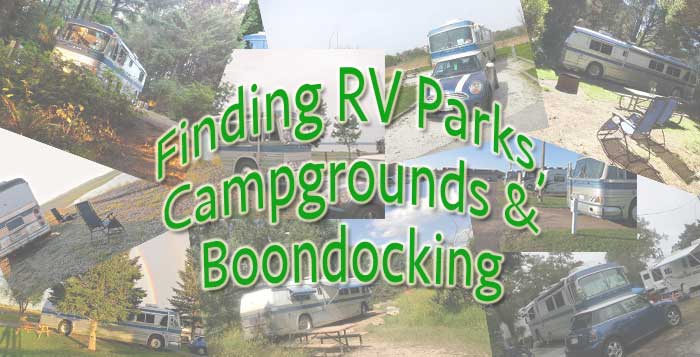
We’ve not updated our finding campgrounds and RV Parks guide since 2010, and wow have things changed – finding great camping has gotten so much easier over the years!
Looking back at our last guide to this topic, we used to rely a lot more on paper and computer based maps. Since then, new apps and research resources have come online, along with more reliable internet connections to utilize them.
First, here is a video chat we did a while back on this topic, including our routing tips, that might compliment the below content (caution, it’s an hour long – make sure you have the bandwidth and time to watch it).
Types of Camping
It’s good to have some familiarity with the general types of camping available:
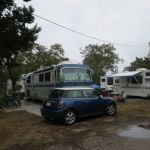 Commercial/Private Campgrounds: Privately owned and operated campgrounds, they can be easy to find. They offer a full range of amenities; from bathhouses, laundry, WiFi, hook-ups, pools, hot tubs, recreation activities, gas/propane, stores and cable TV. These also come at a price, and can be quite tightly packed leaving little to no room between rigs. There are also membership RV Park clubs that you can join and have access to their park systems.
Commercial/Private Campgrounds: Privately owned and operated campgrounds, they can be easy to find. They offer a full range of amenities; from bathhouses, laundry, WiFi, hook-ups, pools, hot tubs, recreation activities, gas/propane, stores and cable TV. These also come at a price, and can be quite tightly packed leaving little to no room between rigs. There are also membership RV Park clubs that you can join and have access to their park systems.
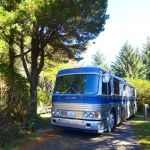 Public Campgrounds: These are run by city, county, state and national entities for recreational use. The amenities and costs vary widely from just providing a spot to park with a picnic table to full bathhouses and electrical hook-ups, so do your research first if you have requirements. They’re usually a bit off the beaten path in gorgeous non-crowded places and less expensive than commercial campgrounds. Of course, some states with budget crunches have increased their rates to higher than surrounding private options.
Public Campgrounds: These are run by city, county, state and national entities for recreational use. The amenities and costs vary widely from just providing a spot to park with a picnic table to full bathhouses and electrical hook-ups, so do your research first if you have requirements. They’re usually a bit off the beaten path in gorgeous non-crowded places and less expensive than commercial campgrounds. Of course, some states with budget crunches have increased their rates to higher than surrounding private options.
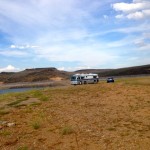 Boondocking/Dispersed Camping: Boondocking refers to camping without provided amenities. Some public lands allow for dispersed camping, which are not developed campsites. The rules vary by agency and location, but generally you just need to find a spot off the road, away from water, and leave no trace. Popular boondocking spots have primitive roads or worn trails leading to them. Other boondocking options include staying overnight in Wal*Mart, Flying J, truck stops, rest areas or city roads.
Boondocking/Dispersed Camping: Boondocking refers to camping without provided amenities. Some public lands allow for dispersed camping, which are not developed campsites. The rules vary by agency and location, but generally you just need to find a spot off the road, away from water, and leave no trace. Popular boondocking spots have primitive roads or worn trails leading to them. Other boondocking options include staying overnight in Wal*Mart, Flying J, truck stops, rest areas or city roads.
Campground Listing Resources
We have yet to find a single comprehensive listing of campgrounds anywhere, so we still generally use multiple resources when looking ahead for options. Here are some of the resources we utilize online for finding RV Parks and campgrounds.
Mobile Apps
These days, apps are where it’s at! We usually turn to the apps first when starting our search.
| Camp & RV by Allstays — $9.99 | 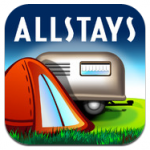 This app has come a LONG way since we first reviewed it a couple years ago, and is now quite the comprehensive RVer’s resource. The price has also gone up substantially, but we think it’s well worth it! Its campground database now has over 28,000 listings – and includes RV resorts, military FamCamps, public campgrounds, overnight parking options, etc. It also includes places that service RVs, dump stations, propane fills and service centers. In addition, it has low clearance bridges marked, rest areas, road grades, construction alerts and tracks some of the basic state laws. Updates are free for the life of the product, and they seem to regularly improve and add content. This app has come a LONG way since we first reviewed it a couple years ago, and is now quite the comprehensive RVer’s resource. The price has also gone up substantially, but we think it’s well worth it! Its campground database now has over 28,000 listings – and includes RV resorts, military FamCamps, public campgrounds, overnight parking options, etc. It also includes places that service RVs, dump stations, propane fills and service centers. In addition, it has low clearance bridges marked, rest areas, road grades, construction alerts and tracks some of the basic state laws. Updates are free for the life of the product, and they seem to regularly improve and add content. |
| Ultimate US Public Campgrounds – $3.99 | 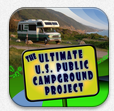 The largest collection of public campgrounds all in one place. They currently have over 21,000 publicly owned campground in the lower 48 states – from US Forest Service, BLM, National Parks, Corp of Engineers, county, city, regional and more. A great resource for finding non-commercial places to camp. Their website at Ultimate Campgrounds is also a great resource for finding campgrounds without an app. The largest collection of public campgrounds all in one place. They currently have over 21,000 publicly owned campground in the lower 48 states – from US Forest Service, BLM, National Parks, Corp of Engineers, county, city, regional and more. A great resource for finding non-commercial places to camp. Their website at Ultimate Campgrounds is also a great resource for finding campgrounds without an app. |
| Campendium – Free
|
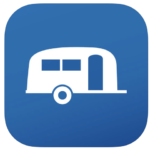 Campendium has become our go-to website for campground reviews – we love that they cover commercial RV parks, public campgrounds and known boondocking gems. Our favorite feature is that they ask folks to rate the cellular signal for each of the four carriers – perfect for us connected nomads! In the past year, they have finally launched their own app – and we loved utilizing it in our recent travels. Campendium has become our go-to website for campground reviews – we love that they cover commercial RV parks, public campgrounds and known boondocking gems. Our favorite feature is that they ask folks to rate the cellular signal for each of the four carriers – perfect for us connected nomads! In the past year, they have finally launched their own app – and we loved utilizing it in our recent travels. |
| Harvest Hosts | 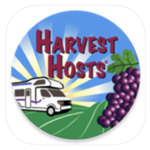 We love our Harvest Hosts membership ($49/yr) – it allows us to stay at unique places like wineries, breweries, museums and farms. Since we do most our planning on our iPhones, logging into their website to research options meant we often missed opportunities. Now with their new app, we can easily scope out our options. During this last RV trip we stayed in more Harvest Hosts locations simply because the app made it so much easier. We love our Harvest Hosts membership ($49/yr) – it allows us to stay at unique places like wineries, breweries, museums and farms. Since we do most our planning on our iPhones, logging into their website to research options meant we often missed opportunities. Now with their new app, we can easily scope out our options. During this last RV trip we stayed in more Harvest Hosts locations simply because the app made it so much easier. |
| ReserveAmerica | 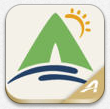 Many public campgrounds, and some private, use ReserveAmerica for their online reservations. Their app can help you find options and make reservations right from your device. Many public campgrounds, and some private, use ReserveAmerica for their online reservations. Their app can help you find options and make reservations right from your device. |
| Passport America – Free | 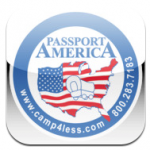 If you’re a Passport America member, this app is an no-brainer to have on your mobile device for quickly searching if there are member clubs on your route. We’ve used this several times in planning our routing and enroute stops. If you’re a Passport America member, this app is an no-brainer to have on your mobile device for quickly searching if there are member clubs on your route. We’ve used this several times in planning our routing and enroute stops. If you’re not a Passport America member, we highly recommend it. The club gets you access to 50% discounts at RV Parks across the country, and the $44 annual membership price will pay for itself with just a couple nights stay. We love the club, and utilize their campgrounds when making transitions between our destinations to dump/fill tanks and recharge. If you’re not a Passport America member, we highly recommend it. The club gets you access to 50% discounts at RV Parks across the country, and the $44 annual membership price will pay for itself with just a couple nights stay. We love the club, and utilize their campgrounds when making transitions between our destinations to dump/fill tanks and recharge. |
| Apps by us:Coverage? – $2.99
US Public Lands – $2.99 |
As mobile app developers we create stuff that solves problems in our own lives. Two of the apps we’ve created for helping us find camping locations:
|
Websites
- Campendium – Launched in early 2015, it’s a RV Park Review site by fellow full timing friends of Aluminarium. What we like about this site is they are including listings for paid and free campgrounds, so it’s a great resource for finding a variety of camping options. The site continues to improve and is targeted at ‘modern RVers’, and we’re excited to see how it evolves. We also love that they ask reviewers to track cellular signals. Since their launch, we’ve switched to leaving our reviews on this site (you can view them here).
- RV Park Reviews – The long time standard in finding RV Parks and reviews. In late 2014 they revised the user interface (not sure it’s necessarily better than before), but it has a wealth of history of reviews. We usually come here first for looking up reviews of campgrounds, and seeing what else might be in the area.
- RVillage.com – This new social RVing site has partnered with Allstays for their campground listing. The unique approach this site takes is showing you how social a particular RV park is. If there’s a few RVillagers checked into the park, it shows up in a different color on their maps. If we’re feeling social, we’ll sometimes route by where the people are. And if we’re not feeling social, we’ll route to where no one is checked in. The first thing we do when we pull into a new location is update our own location in RVillage (when was the last time you updated your location?).
- Ultimate Campgrounds – The largest collection of public campgrounds all in one place. They currently have over 21,000 publicly owned campground in the lower 48 states – from US Forest Service, BLM, National Parks, Corp of Engineers, county, city, regional and more. You can also purchase a POI set for your mapping & GPS programs, and they have an iOS app as well.
- RVParky.com – Another campground listing and review site, that has a companion mobile app. A cool feature is their trip planner where you can save multi-stop routes and find camping options. Several rave about it, but with so many other options out there, it’s not risen up as being a go-to source for us.
- CampSitePhotos.com – Has photos of individual campsites, which can be super useful for giving you a feel of a campground and which spot you might like to reserve.
- CampgroundViews.com – This site takes the angle of having video clips from different campsites, and is run by some fellow full time RVers. They claim to have about 1800 campgrounds covered, which is only a small portion of the options in the US.. but it’s a cool angle. We don’t tend to view much video online, so it’s not a go-to source for us, but you might enjoy it in your search.
Maps
Online Maps
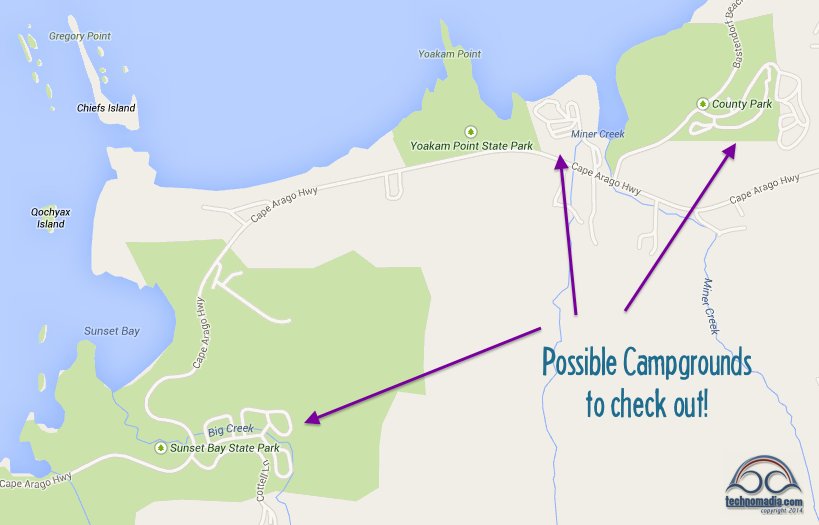
We primarily use Apple and Google Maps on our iPhones & iPad or computers for our navigating, and utilize maps to scope out potential camping locations. Sometimes, just doing a location based search for ‘campground’ or ‘RV Park’ will yield results for us, and then we can further research options from there.
And sometimes just scrolling around on a map in an area you’re interested in visiting, you can identify the tell tale signs of a campground (smaller loops and grids than a typical neighborhood might have). Turning on satellite view and street view, you can also peer into the campground and get a feel for the layout and sites. We’ll sometimes choose the site we reserve this way.
We used to use computer based mapping systems like Streets & Trips, but haven’t even loaded them up in years now – many are no longer actively supported, and with internet as reliable as it’s become, online maps are a better and more up to date source.
Paper Maps
Yes, even in a digital age – paper maps can be a valuable resource. Some maps are quite good about marking public campgrounds, even if only with a symbol. We carry a decent road atlas with us, as well as a variety of state maps we pick up at welcome centers when we cross into new states. Some maps have campgrounds marked on them, but not nearly as many as exist.
Check for Free/Cheap Options
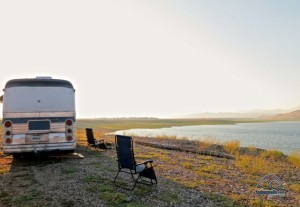
There are places where you can legally stay for free or very cheap. These are a mix of boondocking and developed campsites—usually run by small cities (to attract tourists), counties or national services. And some individuals and businesses also invite RVers to stay with them.
Some of these have been our most spectacular campsites along our journey.
Some retail locations — where allowed by local ordinances — have also opened their parking lots to overnight stays by RVers, most well known being Wal*Mart, Travel Centers and many Casinos. Also, in many states, staying overnight in a rest stop is permissible. Sometimes, you can get away with parking on a public street for a night or two too.
Some of our favorite resources for finding free camping:
FreeCampsites.net – A well designed site with interactive maps cataloging free camping by state run by fellow high-tech full time RVers. We love that they utilize maps to find locations, and the content is crowdsources with feedback from other users. They concentrate on listing scenic public spots, as opposed to retail parking lots for convenient overnight stays enroute.
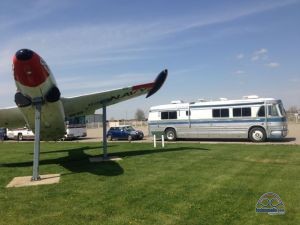
HarvestHosts – These folks have reached out to wineries, farms, museums and other unique locations to make arrangements for their RVing members to stop in for a night. You pay $40 to sign up for the first year (then $35/year) to have access to their constantly maintained and expanding database. Simply call ahead to a location you want drop by to make sure they have availability. We’ve had some great stays parked next to vineyards, sampled some great wines and toured some fun museums. Just caution, stays are rarely ‘free’ as you’ll be tempted to support these businesses by purchasing their products – but they sure are fun and unique stays!
BoondockersWelcome – Boondocker’s Welcome is like Couchsurfing for RVers. Individuals who have parking for RVs can list their location within the website, and RVers can ask to stay. This isn’t only about saving money, but also making new friends along the way. Some of our best experiences have been accepting ‘driveway surfing’ invitations. We honestly don’t use this site often, as we prefer to receive invitations than ask (hint hint), but it’s a great resource and worth the annual fee to join if that’s your thing.
OvernightRVParking – The cost is $24.95 a year to join (and then you get free extensions when you add or update information to the database). Our favorite parts about this site are that they show the parking spots on a map (very useful) and provide very detailed information that is double checked by the site’s administrator. We wish they had a mobile app version, but their website works pretty well on a mobile device. If you decide to join, mention you heard about it from Technomadia, and they’ll give us BOTH a free extra month of service.
Days End Directory – If you’re a member of Escapees.com (a great resource for full time RVers, even offering services like mail forwarding, RVers advocacy, their own park network & discounts, great magazine, etc), then for just $10 you can have access to this extensive directory of free camping options that is regularly maintained by other Escapees members.
US Public Lands App – We designed this app that shows the public land boundaries on a map on our mobile devices. While it won’t single out exact camping locations, it’s a tool we use in finding some unique boondocking locations that might not be listed in other resources.
For some step-by-step tips on finding public land boondocking locations and how we use our app in the process, check out our Finding Magical RV Boondocking article.
Other Online Resources
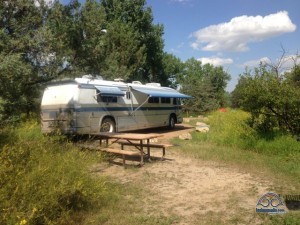
Of course, just searching online via your favorite search engine (Google being ours) yields great results! We find a lot of our great camping by just searching for ‘free campground <city name>’ or ‘RV camping near <city name>’ or other such variations.
RVing bloggers also often write about the places they’ve stayed, so check your favorite blog’s history for ideas and impressions as well. (For our favorites, check out our past Travelogues or our Campground Reviews on RVParking.)
Here are some of the online resources that we’ve found to be quite useful for further researching options:
Passport America – We joined Passport America after many recommendations from fellow travelers as this being the only discount club worth joining. The club offers discounts (generally 50% off) at selected parks across the country. Looking at their directory of campgrounds, they’re fairly well covered. The membership is only $44/year, and we saved that just in our first use of the membership. They also offer free mobile apps to help you located their membership parks. The downside is, most participating parks have limits on when you can use the discount (such as a max of 3 nights, or not over holidays or peak times) – so always be sure to check the rules for any park you’re considering. (If you purchase a membership using the above link or our member # R-0242893 – and we’ll get a $10 credit for our next renewal.. thanks!)
State Park Websites – Most states have a central website that lists all their state parks, using Google (<Name of State> + ‘state parks’ ) to find them is generally quite easy. A lot of states have gone to using ReserveAmerica for their online reservations — which is another option for researching. Reserving your site (and paying the ‘convenience fee’) isn’t always necessary unless it’s peak season, a weekend, a popular spot or you just want to make absolutely sure you have a spot saved for you.
National Park Services — Use this search tool to find information on camping at National Parks (including National Monuments, National Recreation Areas, etc.). Only a few national park campgrounds are reservable, and use recreation.gov to pre-book sites.
National Forestry Services —Use this site to look up a forest or grassland for information on both developed and dispersed camping options.
Recreation.gov – The source for reserving government run campsites. It generally only covers the more popular and reserveable campgrounds, so it’s not nearly comprehensive.
Army Corp of Engineers – These are some of the most under promoted campgrounds, and they’re usually quite spectacular —and free to cheap. You’ll have to use their website to track them down, and it’s often times not intuitive to do. Our trick is looking on maps for lakes and dams (where most ACOE campgrounds are), and then searching based on local cities and landmarks.
Bureau of Land Management (BLM) – A government agency managing land in many of the western states of the US. Dispersed camping is generally allowed on BLM land, unless otherwise noted and some even have developed campgrounds.
When all else fails: Trust Nomadic Serendipity
Sometimes, ideal camping spots just manifest themselves when we need them. There have been several times when we’ve found camping spots without actively looking for them – either by stopping and talking with locals and other travelers, following those handy little campground road signs or not being afraid to peak down a little dirt road into a forest.

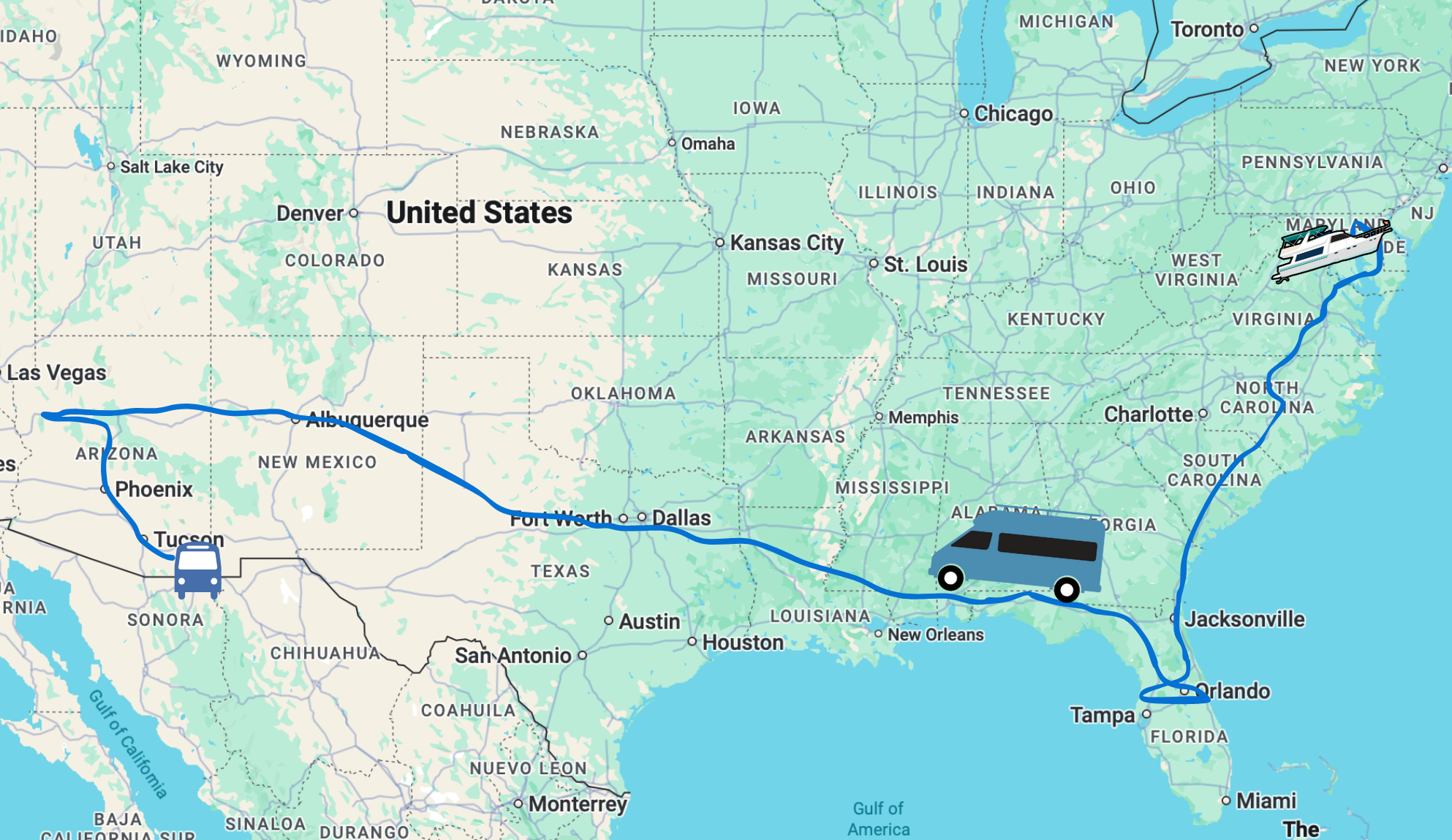
Sooo, this thing called Paper Maps. Is that a free app?
Seriously, we use your US Public lands app and have found some great sites with it. It give us the confidence to venture onto land that one could easily assume to be private ranch land. Lately we found an amazing site at Vermillion Cliffs Monument miles from the nearest camper an just above the Colorado River. Way above. Be Safe!
Planning to rent a Class C RV one-way solo from southern NJ to OR in August — with 4 cats (who don’t go outside). This is all very new to me and I’ve been watching lots of YT videos. I’d like the flattest, coolest, fastest route possible — doing it in about 10 days or less. Thanks so much for your videos. So pleasant to listen to and informative! All suggestions welcome.
Woah, that’s a quick trip… as full-timers we like a much slower pace… 2 months would be about right for us. Here’s our post/video on the subject of how we plan a cross country drive: https://www.technomadia.com/2016/04/getting-across-country-thoughts-on-pace-routing-balance-as-a-full-time-rvers/ Have fun!
Hello Technomads thanks for having CampgroundViews.com in your list. We now have over 2100 campgrounds on film, plus 10,000 photographs and a couple thousand written reviews. We recently revamped the entire website for search, look and navigation. Take a peek at the new look and thanks for the inclusion on the list. Mark
Hello,
So glad you are back blogging as your latest post brought me back to this video. This piece is a wonderful one. You have given me the courage to not worry about much of anything when we go on the road in 2017. Thank you for everything.
Laura K.
Cherie –
Another source not mentioned is the Yahoo Group “Walmartrving” for those who like to make a quick overnight stop, just not for long-term stays. Must join for access, group is tightly controlled to keep out the riff-raff, although now and then an entertaining thread ensues. Here’s the link:
https://groups.yahoo.com/neo/groups/walmartrving/info
FWIW & HTH. . .
🙂
Thanks RJ. We actually prefer using AllStays and OvernightRVParking when looking for quick overnight stays.. then we see all the options, on a nice map, not just Walmart options.
Hi Guys. We’ve been following your blogs and helpful advice for awhile now. We are planning on buying an RV this spring to hit the road as soon as possible. We’re okay with boondocking a week or so a month, but I have a business I can run from the road and we prefer more comforts – though not the crowds and screaming kids. I’m wondering if you looked into 1000 Trails and think it’s a decent membership for quality RV parks and decent coverage across the US? It seems after you get back the initial registration fee, that it might make sense to get 2 zones for around $550/year and we could boondock in between the lock-outs. Any opinion on 1000 Trails trade-offs over your recommendation of Passport America? We’d also like to hear if you have an opinion on Harvest Hosts? By the way, in case it has bearing on your advice, we’re shopping for a newer Tiffin Allegro Bus 37AP (actually 38′ feet with change).
Thanks for the wonderful resource! You’ve obviously put a lot of thought and care into your website. Hope to see you two down the road!
~ DC
Welcome to the blog guys….
TT is one of those memberships that if it works for you, it can be a good deal if you utilize them. Their parks are rarely in places we want/need to be, and not generally our style – so we’ve never had a membership. But, if they happened to be where we want to be anyway, we’d consider a zone pass to try it out. Not something we’re itching to do however.
We enjoy HarvestHosts quite a bit.
We love your posts and can’t tell you how inspiring they are. We are planning on hitting the road full time in June and are soaking in all of the information we can get our hands on! We both plan on working while we travel and are encouraged that you and so many of your fellow travelers have made that happen!
Keep posting – hopefully our paths will cross one day soon. Kim
I made a internet drawings service and have been plaining this for years
Im just starting off have been going to all the parks around where I live to see how it all works and will be headed down the road in the next few weeks and your web site is the best thing I seen in all my resreach on RVing, thanks for all the great insite.
LOVE your video chats! We intend to go full-time in a few months and you have helped me acquire the proper mindset for this new life adventure. You guys have taught me so much in such a short time – God Bless You!
Great post. We use Allstays with good results. And definitely the Trust the Loving (nomadic) universe option..
Now we need to find places with cable TV for the World Series. Still reeling from Millenicom.
I so appreciate the depth in your guys writing. Thanks for being so generous with the information you share!
You missed the biggest collection of public campgrounds in the Lower 48. Over 21,000 campgrounds, disbursed camping areas, etc.
http://www.ultimatecampgrounds.com/uc/index.php
I have no financial interest in this site. It’s my go-to reference When searching for public camping. They has an Apple App. as well. A nice resource.
Ahh.. thank you, I was trying to remember that one. Couldn’t find the app in the app store, and had assumed they didn’t make it. Great to see it still around! We’ve been missing being able to recommend the CampWhere app that used to fill this niche.
Cherie, timely post for me. Have been full-timing since December, but this will be the first time I will be out looking for locations in an unfamiliar area – Texas. I have been struggling trying to find hosting opps, free campgrounds and boondocking sites. This post has given me some new ideas to try. Don’t worry, if nothing else, we’re going on trust anyway.
Do you get a referral if I sign up with Passport America? I didn’t get far enough into the sign up process to see if there was a field for that. Feel free to send me a link if it works like that. We almost signed up for a very expensive membership this weekend that we learned about at the Tacoma RV show but this sounds much better. Thanks!
If you use the link in this post to sign up, it should give us a credit on our account when we go to renew. Thanks!
Love love love this!!!! Thank you so much and will be referring back come Spring when the new trailer makes it debut!